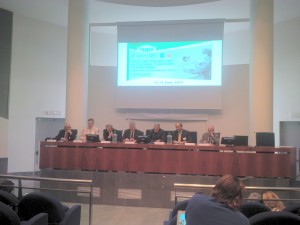EVENTS Exploring the Life of Jews in Libya, 50 Years after Their Flight
With the 50th anniversary of the arrival of Libyan Jews in Rome approaching, many events are being held in the city to remember their escape from this Arab country in 1967 and their integration in Italy. The University of Rome 3 hosted an international conference on, Italy and Italian Jews in Colonial Territories During WWII: Libya, Dodecanese and East Africa. The two-day conference was organized by the Documentation Center of North African Jewry During WWII, the Ben Zvi Institute, the World Organization of Libyan Jews and the CDEC – Centro di documentazione ebraica contemporanea, a Milan-based center that researches Italian Jewry in contemporary history.
After the greetings by David Meghnagi, a clinical psychologist at the University of Rome 3, its Dean, Mario Panizza, Haim Sadoun, Director of the Ben Zvi Institute,the Israeli Ambassador to Italy, Naor Gilon, and CDEC Director Michele Sarfatti, the conference featured lecturers coming from all around the world.
How did the Jews live during the Fascist period in the colonies, places that were geographically and culturally part of Italy, but as a matter of fact were Italian? But mainly, how are those years remembered – and thus narrated – by those who lived them? These were the questions at the heart of the conference, which significantly started with a first-hand testimony. Dan Nunes Vais read some pages from the unpublished diary of his father, Roberto Nunes Vais, a Libyan Jew who had written some private notes on Italian life in Tripoli between the 1940s to the 1960s. These were insights on the local and global dynamics of the Second World War from a Jewish and North African perspective, with the purpose of “mirroring the mood and the material aspects during this third year of war.”
Among the many other aspects analyzed during the two days, Maurice Roumani, political scientist at Ben Gurion University of the Negev, explained why the vicissitudes of North African Jews during the Holocaust are nowadays often missing from the mainstream discussion, despite the cruelty of the persecution. He identified many reasons, “a problem of scarce knowledge, which also involves a certain prejudice, the fact that the European tragedy was so huge that it left little space to other contexts, and also the lack of professional instruments to narrate those stories at the moment of the founding of the State of Israel, when many of the Jews from these regions emigrated there.”

